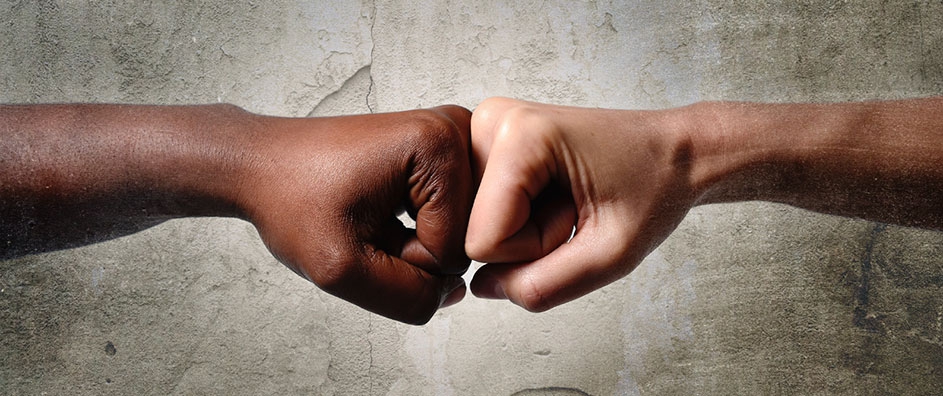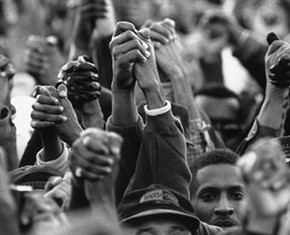The views expressed in our content reflect individual perspectives and do not represent the authoritative views of the Baha'i Faith.
If you’ve participated in, or listened to from afar, the growing conversation on race in the United States, you might have heard racism described as America’s original sin. That term definitely sounds like a heavy criticism. But many people might not understand what it means.
Original sin—a phrase from Judeo-Christian theology—means an inborn separation from God, passed down to all humanity from Adam and Eve.
Just as a Christian may think that all people are born with original sin, many critics of racism think that institutionalized white supremacy isn’t just an attribute of American society, but is instead an aspect of its essential identity over the past four centuries. These two ideas of original sin and systemic racism function in similar ways. So a little meditation on a few themes from Christian theology can provide useful conceptual tools for analyzing and overcoming racism, a condition Baha’is view as the destroyer of human society.
What makes original sin original is not that it is unique or creative in some way—that’s a different use of the word. Instead, we call it original because it has to do with origins. Judeo-Christian theology says when Adam and Eve lived in the Garden of Eden, they and everything in it existed in harmony with each other and with God. But God told them not to eat from the tree of the knowledge of Good and Evil. Because they disobeyed, God cast them out of the garden and forced them to live in this world characterized by toil, suffering, and death.
This symbolic story explains that because of our origin outside the garden, all members of the human race are naturally separated from God at birth. Jesus came to offer each of us the possibility of salvation from this earthly condition, so that our souls can reunite with our Creator.
So what’s the connection with systemic racism? It may appear in the way original sin disturbs our everyday sense of personal responsibility. Original sin marks a person as guilty, even without doing a bad deed or failing to perform a good deed. The whole idea of original sin strikes many as unfair because it looks like a condemnation without a crime. When people react by saying, “But that’s not my fault!” they rightly wonder why they are personally implicated in the mistakes of Adam and Eve.
This same basic problem occurs with issues of racism and racial injustice. Who we are and the effect we have on the world is not determined solely by what we choose to do—it is also shaped by the wider context into which we are born and from which, to a great extent, we cannot remove ourselves. For Judeo-Christian theology, that context is humanity’s fall from grace in the Garden of Eden. In the context of anti-racism work, the historical centrality of white supremacy to American social structure makes us all inheritors of the original sin of slavery and racism.
On this point, the concepts of original sin and the critique of systemic racism function in very similar ways. Those whose racial background places them in a position of privilege don’t need to do anything unfair to gain an unfair advantage over those from marginalized racial backgrounds. They were simply born into it. Their skin color gives them an inherent advantage over others, whether they approve of it or not. Likewise, people of color face disadvantages in life that come from a systemic cause. As millions of people can attest from personal experience, having black or brown skin can be a punishable offense on its own.
On whichever side of “the color line” we find ourselves, before we are born, before we can ever make a moral choice, racism has already shaped the direction of our lives. That original sin marks each person for punishment or for reward on the basis of physical origins, and not freely-chosen actions.
That condition negatively effects everyone. But there’s more to original sin than that—there is also redemption. It can be hard to believe that a dramatic turn towards racial justice can ever possibly happen. But for me, personally, I’ve found that the teachings of the Baha’i Faith and the pattern of life exemplified by Baha’i communities, individuals, and institutions have kept my eyes on the prize of a society vastly different and vastly better than the one we have today. In many places, the Baha’i writings envision these possibilities for a harmonious racial future:
The unity which is productive of unlimited results is first a unity of mankind which recognizes that all are sheltered beneath the overshadowing glory of the All-Glorious, that all are servants of one God; for all breathe the same atmosphere, live upon the same earth, move beneath the same heavens, receive effulgence from the same sun and are under the protection of one God. This is the most great unity, and its results are lasting if humanity adheres to it; but mankind has hitherto violated it, adhering to sectarian or other limited unities such as racial, patriotic or unity of self-interests; therefore, no great results have been forthcoming. – Abdu’l-Baha, The Promulgation of Universal Peace, p. 191.
Know ye, verily, that the happiness of mankind lieth in the unity and the harmony of the human race, and that spiritual and material developments are conditioned upon love and amity among all men. – Abdu’l-Baha, Selections from the Writings of Abdu’l-Baha, p. 286.
The story of original sin does not end with Adam and Eve’s expulsion from the garden. Neither does the story of systemic racism have to end with oppression. Christian theologians formulated the idea of original sin to help explain the symbolic meaning of Christ’s salvation. Jesus accepted death on the cross so that those who believe in him will be spiritually reborn with him in his resurrection. Baha’u’llah accepted a life of torture, exile and imprisonment to free the world from disunity, hatred and separation, and to unite the races into one human race.
Because of my convictions as a Baha’i, I think the analogy between original sin and systemic racism holds true on this point. No matter how entrenched racial hierarchy is in people’s minds and in the outer world, we now have reason to anticipate a profound spiritual reshaping of our social condition and physical identities.
That’s the central Baha’i message: Unity is possible. Systemic racism can be undone. The United States, and every other country that suffers from the legacy of slavery and racism, can be spiritually and racially reborn.
















Comments
Sign in or create an account
Continue with Googleor